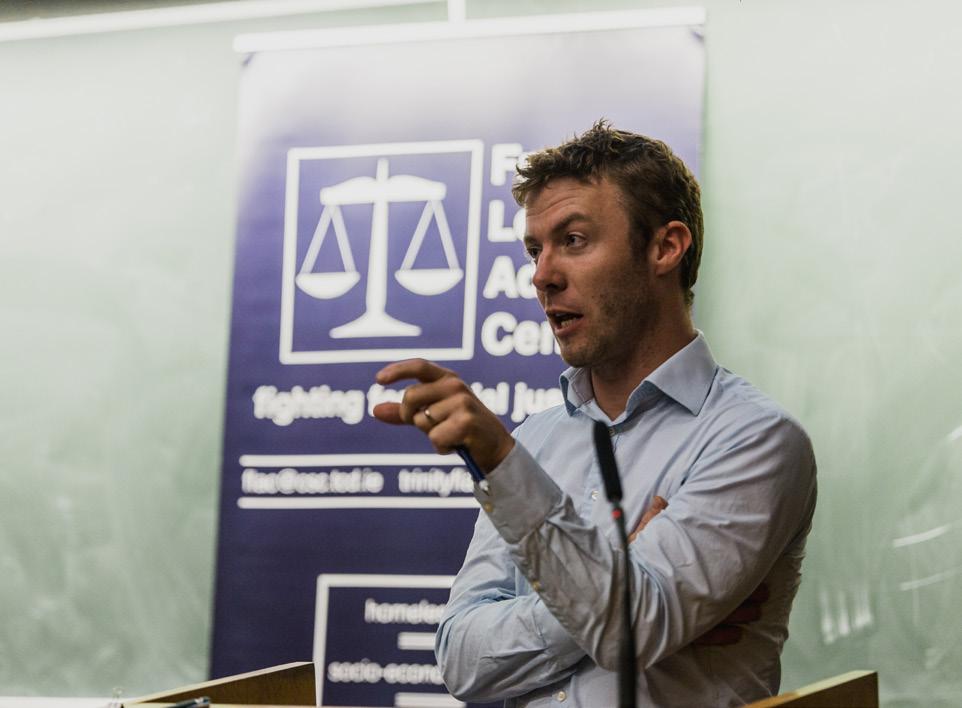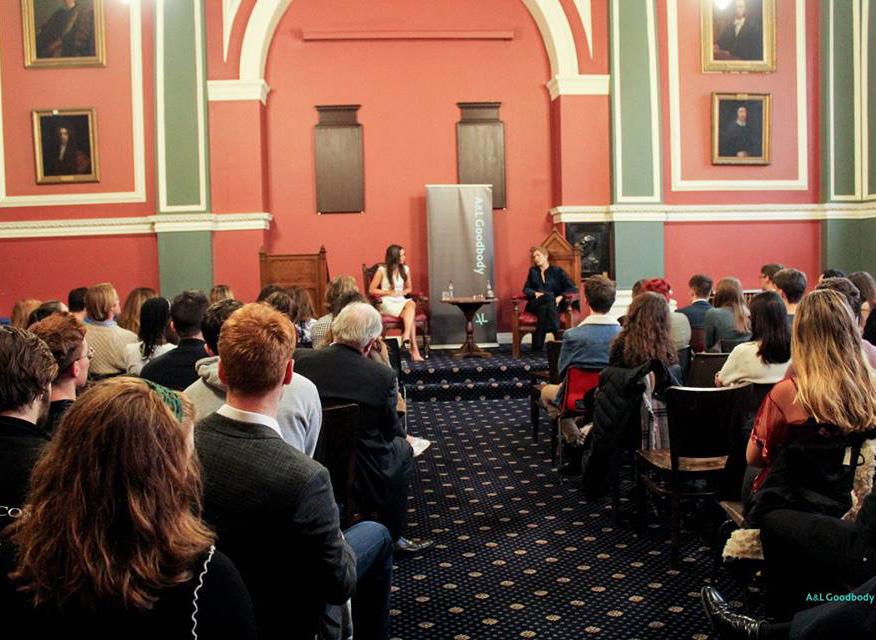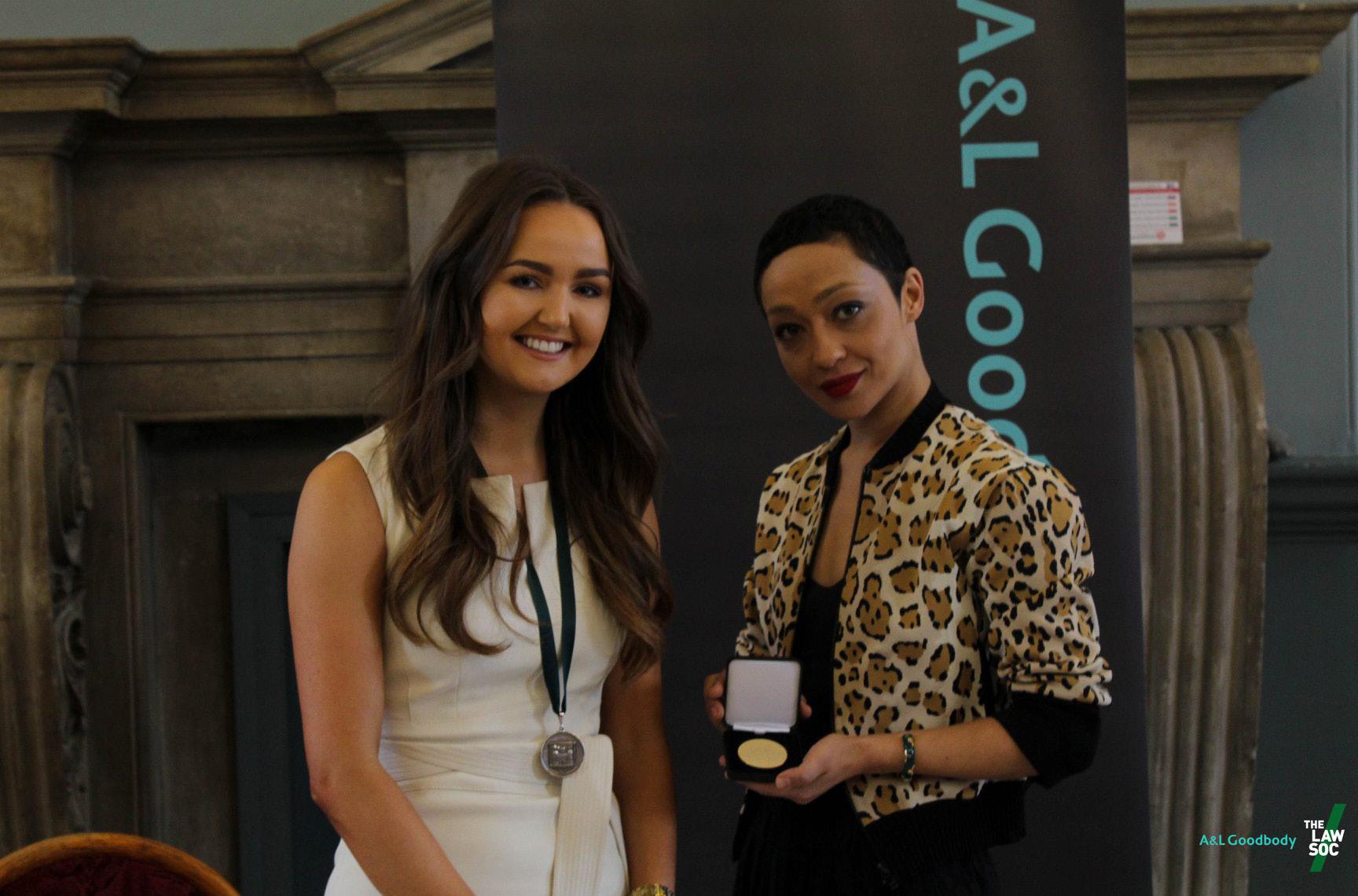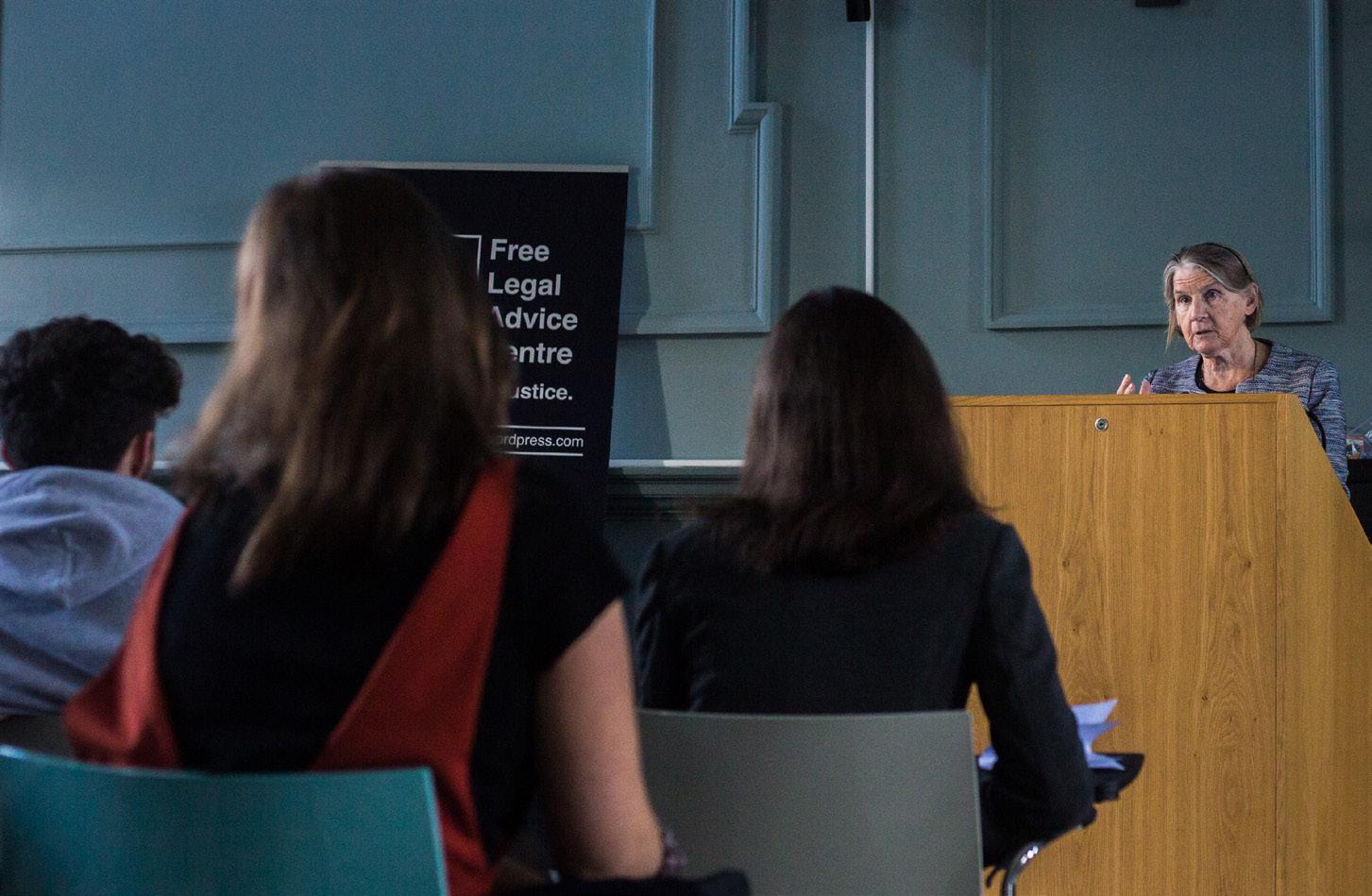
16 minute read
The Social Section
Ruth Negga Talk
On Friday, October 19th, LawSoc welcomed Oscarnominated actor and Trinity alumnus Ruth Negga to give a captivating talk at Regent House. Negga has had an illustrious and varied career, from starring in TV shows such as ‘Love/Hate’ and ‘Agents of S.H.I.E.L.D.’ to her portrayal of the eponymous character in the recent production of Hamlet at the Gate Theatre. Negga took time out of her busy schedule to discuss her life and career, providing the audience with a fascinating insight into the world of acting, before giving those in attendance the opportunity to ask further questions in a Q&A session. From the moment that she began speaking, Negga’s sheer passion for the craft of acting was evident. She eloquently described how her career as an actor was a vocation and how she was drawn to it by seeing the importance that lies in the art of storytelling. This was a recurring element of the talk, as Negga frequently brought up the significant impact telling stories can have on the world. One such example of this is the movie Loving, a powerful portrayal of the famous 1967 U.S. Supreme Court case of Loving v Virginia, challenging the constitutionality of laws prohibiting interracial marriage. Negga spoke with typical Irish modesty about being nominated for an Academy Award for her performance in this film, but she did express how honoured she was to have been involved in the telling of this remarkable story. She also detailed how she prepared for this role, such as how she was given access to unreleased documentary footage of Richard and Mildred Loving to use as reference material. Negga then briefly discussed life in Ireland, commenting on how much Ireland has changed politically and socially since she grew up here. She explained that she was delighted to be back in Trinity College and how she had many fond memories of her time here. A highlight of the talk was Negga’s revelation that she had never bothered to visit the Book of Kells during her time studying at the college, although she promised that she’d get around to it soon. She then offered some wise advice to Trinity students: “dig in and own your space”. The Q&A section of the talk allowed for some thought-provoking questions, leading to Negga discussing the challenges of portraying Hamlet in the Gate Theatre, and her plans for the future. Her next project is a film called ‘Passing’, which delves into the themes of racism and gender inequality in America in the 1920s. It promises to be a riveting watch. She also mentioned her aspiration to become a producer and do more work behind the cameras. Wherever the future holds, there is no doubt that Negga will face it with the same infectious enthusiasm which made her talk so enjoyable for all in attendance. Be it on the big screen or on the stage, Negga will continue telling stories that matter. By Feargus Campbell
Advertisement
LawSoc Masquerave
The brightly-lit Pav shone like a beacon against a backdrop of inky darkness, its light flooding across Trinity’s rugby pitch. Excited chatter echoed all around, charging the air around us with electricity. Gowns sashaying, brogues clacking rhythmically on the pavement, bags of cans, and masks, of all shapes, sizes and colours. LawSoc’s annually Masquerave was upon us. Tonight was all about escapism: a chance to leave the law books aside, to get out of the city and to have an unforgettable time. The double-decker buses soon eased up to Nassau Street. More excited yelps as dozens of students lined up haphazardly to secure a seat. The bus was singing with energy-- quite literally. Everything from Irish country music to cringey pop hits, even a “Happy Birthday” got a rendition along the way. By the time we arrived at Location X an hour later, I was laughing so hard my eyeliner was beginning to smudge. Our secret destination was actually a not-so-secret destination: as predicted, Charleville Castle loomed ahead of us as the bus meandered through the Offaly countryside. Pulling through the wrought-iron gates, I gasped involuntarily. I had forgotten just how beautiful it was. Grey stone and domineering turrets, leafy surroundings, all illuminated by scintillating purple and indigo spotlights. Once in the ballroom I was plunged into darkness, surrounded by a sea of strangers in masks. But then the lights began to flicker and the music erupted, a euphoric burst of sounds as Dua Lipa’s “New Rules” hit its iconic chorus. Effervescent spectrums of colour danced across us. I looked up at the overwhelming architecture of the ballroom, illuminated by shades of magenta. The intricate carvings and imprints on the walls, a domed ceiling that simultaneously inspired wanderlust and made me feel incredibly small. People moved in synchronicity to the thundering rhythm of music, hands waving everywhere. It became like a strange game of hide and seek, as I pivoted my way through everyone, scrutinising
each person to see if I recognised the face under the mask. The music alternated between hits of cheesy goodness like Madonna’s “Hung Up” and raving tunes, catering to the tastes of all in the audience. It was as if I was spinning between two worlds, that of your archetypical Trinity law student, and a utopian Elysium of dance, laughter, colour and high fashion. Eventually, I needed to catch my breath. I descended the grand staircase and exited the castle. In a moment of relative peace, I was enthralled by everything around me: the skies and glittering stars, the tall trees and olfactory delights of cigarettes, cologne and pizza. Pizza. To my left, the glorious pizza van, masked students flocking to it like pizza was going out of fashion; hot, steaming slices fresh out of a stone-baked oven. Eventually, it was time for the dreaded trek home. But the party spirit refused to die. Even as the masses of freezing, gleefully inebriated and masked students climbed back onto the bus, the banter still ran wild. As we pulled away, I began to lull with sounds of the engine, catching myself dozing off out of sheer exhaustion. Without a doubt, LawSoc had elevated the event to even greater heights this year, never at any point failing to delight. Everything about the night was perfect. I just wished I could stay in the fairy-tale for a while longer, but as morning dawned, reality beckoned us back to the perennial rise and grind of law student life. By Orla Murnaghan
On 17 October TCD FLAC, in collaboration with TCD LawSoc and TCD Environmental Society, hosted a talk on the Friends of the Irish Environment v Fingal County Council case. The speakers at this event were John Kenny BL, a specialist environmental lawyer who represents Friends of the Irish Environment, Orla Kelleher, a UCD PhD candidate whose research area is climate change law, Professor Peter Thorne, a leading expert on global climate change who was recently appointed co-ordinating lead author to the UN Intergovernmental Panel on Climate Change, and Fred Logue, a solicitor who worked on the Friends of the Irish Environment v Fingal County Council case. The first speaker on the night was Professor Peter Thorne, who gave a general overview of the current climate situation. He highlighted that there has been evidence of climate change since the 19th and 20th centuries, and as such that it is not necessarily a recent issue but one that has become exponentially more pressing in recent times. Professor Thorne spoke of the significance of the 2015 Paris Agreement and the importance of measures being put in place worldwide to contain the global rise in temperature. He linked the broader concept of climate change to specific events, particularly the heatwave we experienced in Ireland this summer, which was two times more likely due to climate change. This discussion of recent events that almost everyone in the room had personally experienced brought home the reality of climate change for the audience. Professor Thorne spoke of the fact that one of the issues with climate change is that it is a slow car crash, and as such doesn’t receive the immediate and heightened attention that such a potentially disastrous problem deserves. He elaborated on this point by discussing the use of financial instruments to ensure that the issue is tackled. His final note was that the issue of climate change is fundamentally about what world we want to leave to future generations and how willing we are to take the difficult steps to achieve this. The second speaker, Fred Loake, spoke more specifically about the Friends of the Irish Environment v Fingal County Council case. In this case, Friends of the Irish Environment challenged the decision of Fingal County Council to issue a five-year extension to the Dublin Airport Authority for their planning permission to construct a new runway. The ten years originally granted for the planning permission had expired as a
result of insufficient funds due to the 2008 financial crash and the recession that followed. Friends of the Irish Environment claimed that with another runway there would be far more pollution, and that this would damage the environment. As such, they argued that construction shouldn’t go ahead due to the fact that the public has a right to a clean environment. While the High Court declined to grant any of the relief sought by the plaintiffs as they had failed to assert a viable claim for standing, Mr Loake asserted that the case can be seen as a huge positive in the area of the judicial approach to climate change. This is because the High Court judgement recognised a ‘personal constitutional right to an environment’ under the Irish Constitution. Mr Loake highlighted the fact that this case shows that the ‘little guys’ can take on the ‘big guys’ and succeed, and encourage all the future lawyers in the room to recognise the importance of bringing cases which can change the world we live in. The third speaker on the night, Orla Kelleher, spoke about the importance in regard to climate change and environmental law of reconceptualising human rights. She drew attention to the fact that over 100 countries have implicitly or explicitly recognised right to clean environment, and that there are currently over 1,000 cases that have been taken to court globally relating to climate change. One such example of this international climate litigation is the 2015 Urgenda Climate Case against the Dutch government, which was the first case worldwide in which citizens held their government accountable for contributing to climate change. With the Dutch High Court ruling in favour of Urgenda, the government has been forced to take more effective action on climate change. Ms Kelleher also spoke in strong language of the Friends of the Irish Environment v Fingal County Council ruling’s potential to support future cases in this jurisdiction. Specific mention was given to the upcoming case due to be heard in January 2019, in which Friends of the Irish Environment are seeking to hold the government accountable for its role in knowingly contributing to the dangerous levels of climate change we are currently experiencing. The final speaker on the night was John Kelly, one of the barristers who represents Friends of the Irish Environment. He spoke in more detail about the Friends of the Irish Environment v Fingal County Council case, notably on the reasons why it failed in court and also on the impact the judgement may have on future cases. He highlighted the cautionary note of Mr Justice Barrett, in that there was no identification of how the right to an environment could be engaged in Irish courts, indeed the question still remains as to whether it can ever be meaningfully engaged. Mr Kelly suggested that it would be appropriate for cases related to climate changed to be pleaded against both the state and individuals, primarily corporations. He noted that with the recognition of the right to an environment comes the responsibility to avail of this right, as we all have a collective obligation to protect our environment. Following the informative and engaging speeches of the four panellists, the audience participated in a questions and answers session, which highlighted the interest of all those in attendance in the issues that had been discussed. The talk was both sobering and inspiring, and hopefully will encourage everyone who attended to think about the part they can play in tackling climate change and safeguarding the future of the planet. By Caoilainn McDaid
The Rise of Illiberal Authoritarianism in Europe in Association with the IIEA
On the 26th of October 2018, The Institute of International & European Affairs (IIEA), in association with Trinity Research in Social Science, presented its talk on whether the EU was responsible for the Decline of Democracy and the Rise of Illiberal Authoritarianism in Europe. This talk was the next in the distinguished series on Populism and the Challenges to the Liberal Order. The talk was joined by Professor Grainne de Burca of the New York University School of Law. The talk, however broad in scope, focused on the developments that has allowed authoritarianist governments to grow and key questions of whether the structure, function and response of the EU to national concerns has given rise to Illiberal democracies throughout Europe. Professor de Burca traced the recent rise of the illiberal democracies in Europe to the Maastricht Treaty—which was the beginning of the European political project, and a shift from the Economic integration that was espoused by the original European Economic Community. In particular, from 2007, it was expressed that the EU faced a number of crisis which undermined its faith among member citizens and its ability to respond to national concerns—from the banking crisis, the global
recession, the refugee crisis and the rise of the far right. Examples of illiberal European democracies were given through Poland and Hungry, particularly Prime Minister Orban of Hungry who’s government has consolidated power and created a de facto authoritarianist regime. Professor de Burca explained the sets of developments that has occurred throughout Europe giving rise to Illiberal democracies in the EU. First, Professor de Burca noted the popular rise of Euroscepticism and the disenfranchisement of European citizens towards the EU—both on the political left and right. In particular, the rise of right-wing Euroscepticism was traced from the beginning of the Maastricht Treaty to current iterations in the United Kingdom, Hungry and Poland. Euroscepticism presents itself through a belief that the EU seeks to dilute national sovereignty, as well as an opposition to growing immigration trends. It was expressed that Euroscepticism is essentially a regional manifestation of an international movement of an opposition to globalisation and economic integration. Right-wing Euroscepticism manifested practically from the recent decision of the United Kingdom to leave the European Union. Furthermore, it was submitted that the rise of the far right, particularly in Germany and Hungry, has provided the incentive for centre-right political parties to re-position themselves further right in order to capture the populist support for far-right policies and objectives. It was expressed that the far right had successfully re-framed itself as the guardians of European civilization and had learned from its past. The rise of the new far right had been exacerbated by the refugee crisis, shifting the Overton window of acceptable political discourse. The new far right has also managed to successfully capture the populist policies of the political left—in particular, the support for re- distributionism and a distrust of the political class. Lastly, opposition to economic neo-liberalism has spread the growth of illiberal ideologies in Europe. The EU, it was argued, is essentially a project of market integration and a regional example of global capitalism. The new populist right in Europe has framed this dichotomy in terms of globalisation verses economic nationalism. Consequently, the populist argument considers that economic neoliberalism undermines national society and helps the world—which need to be counter-balanced by growing tariffs, protection of national industry, and a reduction of immigrant labour workers. The second half of the talk pertained to the EU’s organisational structure and how its esoteric culture and slow responsiveness to the big issues has given rise to Illiberal democracies throughout Europe. The democratic deficit of the EU has been a major concern. Specifically, because the EU is not a proper functioning democracy and there is distrust in the ability of member citizens to make changes to how the EU functions and the laws it creates. Furthermore, it was demonstrated that the EU has lacked a coherent response to immediate concerns and crises, resulting in the distrust of the EU and creating a backlash against its institutions. Moreover, it was indicated that the EU challenged democracy through its support of Executive Dominance—empowering Ministers and Councils to create the key decisions and taking the power from national parliaments. The secrecy of the EU, its technocratic culture, and its prioritisation of economic integration over social objectives has enflamed the critiques aimed against this organisation. Professor de Burca conveyed that the EU was not ultimately responsible for the rise illiberal democracy, but it must do more to gain public trust and accountability. In particular, the EU needs to respond adequately to the social, political and economic concerns of member nations. The EU should set an example of transnational co-operation to the world, and represent a humane form of globalisation which also respects the sovereignty of all nations. The talk provided a broad overview of the current geo-political dynamic in Europe, and the conflicts that have been presented between the EU and member states. The talk was followed by a lively Q & A about how the EU can resolve itself to provide for the concerns of member citizens and its role in the future. The talk concluded on the assessment that the EU still has a future to play in Europe— but as long as it appreciates its shortfalls and democratic deficit, and addresses the concerns of member nations and citizens. By Tasin Islam


























